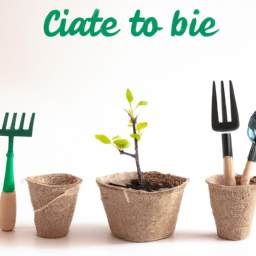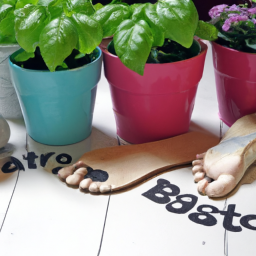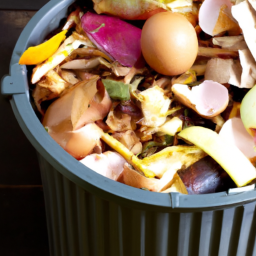
Hey there, garden enthusiasts! Have you ever wondered how to transform your kitchen scraps and yard waste into nutrient-rich soil for your plants? Well, you’re in luck! In this blog post, we’ll be diving into the world of composting basics: turning waste into garden gold. Composting is not only an environmentally friendly way to reduce waste, but it also provides a cost-effective solution to nourish your garden with natural fertilizers. So, whether you’re a seasoned gardener or just starting out, this article will guide you through the simple steps of composting and help you unlock the secret to growing lush, thriving plants. Let’s get started!
The Benefits of Composting: Exploring the Positive Impacts on the Environment and Your Garden
Welcome to the world of composting, where you can turn waste into garden gold! Composting is not only a fantastic way to reduce waste, but it also provides numerous benefits for the environment and your garden. In this article, we will delve into the positive impacts of composting and how it can transform your gardening experience. So, let’s dive right in!
Reducing Waste and Landfill Impact
Composting is a natural process that breaks down organic materials into a nutrient-rich soil amendment called compost. By composting, you can divert a significant amount of waste from ending up in landfills. In fact, organic waste, such as kitchen scraps and yard trimmings, makes up a substantial portion of the waste stream. When these materials decompose in landfills, they produce methane, a potent greenhouse gas that contributes to climate change.
By composting your organic waste, you can significantly reduce the amount of methane released into the atmosphere. Instead of contributing to the landfill problem, you’ll be actively participating in waste reduction efforts and making a positive impact on the environment. It’s a win-win situation for both you and the planet!
Moreover, composting helps to enrich the soil and reduce the need for chemical fertilizers. When you add compost to your garden, it improves soil structure, enhances moisture retention, and provides essential nutrients to plants. This leads to healthier plants with increased resistance to pests and diseases. By utilizing compost, you can create a sustainable garden ecosystem that thrives without relying on synthetic additives.
Improving Soil Health and Nutrient Cycling
Compost is often referred to as “black gold” due to its incredible benefits for soil health. When you add compost to your garden, it enhances the soil’s ability to retain moisture, which is especially beneficial in dry climates or during periods of drought. The improved moisture retention reduces the need for frequent watering, saving both water and money.
Furthermore, compost acts as a natural fertilizer, providing a wide range of essential nutrients that plants need to grow and thrive. Unlike synthetic fertilizers, compost releases nutrients slowly over time, ensuring a steady supply for your plants. This slow-release mechanism prevents nutrient leaching, which occurs when excess nutrients are washed away by rainfall or irrigation, potentially polluting water bodies.
Composting also promotes nutrient cycling in the soil. When organic materials break down, they release nutrients that become available to plants. These nutrients are absorbed by the plant roots, utilized for growth, and eventually returned back to the soil through fallen leaves, dead plant matter, and root exudates. This continuous cycle of nutrient uptake and release contributes to the overall health and fertility of the soil.
Enhancing Biodiversity and Beneficial Microorganisms
Compost is not just a source of nutrients; it also supports a diverse community of beneficial microorganisms. These microorganisms play a crucial role in breaking down organic matter, releasing nutrients, and improving soil structure. They enhance soil aeration, drainage, and nutrient availability, creating an ideal environment for plant growth.
Additionally, compost attracts a variety of beneficial insects, earthworms, and other soil-dwelling organisms. These creatures help to control pests, aerate the soil, and further break down organic matter. By promoting biodiversity in your garden through composting, you can establish a balanced ecosystem that naturally regulates pests and diseases, reducing the need for harmful pesticides.
In conclusion, composting offers numerous benefits for both the environment and your garden. By diverting waste from landfills, improving soil health, and promoting biodiversity, composting helps create a sustainable and thriving garden ecosystem. So, why not start composting today and turn your waste into garden gold?
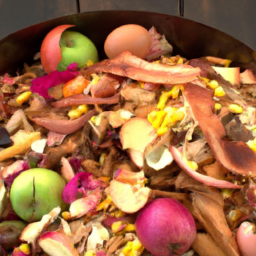
Getting Started with Composting: A Step-by-Step Guide for Beginners
Introduction
Welcome to the wonderful world of composting! If you’re looking to turn your kitchen and garden waste into nutrient-rich soil for your plants, you’ve come to the right place. Composting is a simple and rewarding process that not only reduces waste but also improves the health of your garden. In this step-by-step guide, we’ll walk you through the basics of composting and help you get started on your composting journey.
1. Choosing the Right Composting Method
Before you begin composting, it’s important to decide which composting method suits your needs and space. There are several options to choose from:
- Backyard Composting: This is the most common method, suitable for homeowners with a backyard or garden. It involves creating a compost pile or using a compost bin.
- Vermicomposting: Ideal for those with limited space, vermicomposting uses worms to break down organic waste in a specialized container called a worm bin.
- Trench Composting: If you have a large garden, trench composting involves burying organic waste directly in the soil, allowing it to decompose over time.
Choose the method that best fits your situation and available resources.
2. Collecting Compostable Materials
Now that you’ve chosen your composting method, it’s time to start collecting compostable materials. These include both kitchen scraps and yard waste. Here’s a list of what you can compost:
- Fruit and vegetable scraps
- Coffee grounds and tea leaves
- Eggshells
- Grass clippings
- Leaves
- Shredded newspaper
- Prunings and plant trimmings
Avoid adding meat, dairy, oily foods, and pet waste to your compost pile as they can attract pests or introduce harmful bacteria.
3. Building Your Compost Pile
Now that you have your compostable materials, it’s time to build your compost pile or fill your compost bin. Follow these steps:
- Choose a suitable location for your compost pile. It should be in a well-drained area that receives partial sunlight.
- Start by adding a layer of twigs or straw at the bottom to aid in aeration.
- Add a layer of compostable materials, alternating between green (nitrogen-rich) and brown (carbon-rich) materials. Greens include fresh grass clippings and kitchen scraps, while browns include dry leaves and shredded newspaper.
- Moisten the pile as you go, aiming for a damp sponge-like consistency. Avoid overwatering, as it can lead to anaerobic conditions.
- Continue layering greens and browns, ensuring a good balance between the two.
- Occasionally turn the pile with a pitchfork or compost aerator to aerate it and speed up decomposition.
4. Maintaining Your Compost
Composting is an ongoing process that requires regular maintenance. Here are a few tips to keep your compost pile healthy:
- Monitor the moisture level and add water if it becomes too dry or cover it during heavy rains to prevent oversaturation.
- Turn the pile every few weeks to ensure even decomposition and prevent odors.
- Avoid adding weed seeds or diseased plants to your compost, as they may survive the composting process.
- Consider covering your compost pile with a tarp or using a compost bin with a lid to keep pests away.
Conclusion
Congratulations! You’ve now learned the basics of composting and are ready to turn your waste into garden gold. Remember to be patient, as composting takes time. In a few months, you’ll have nutrient-rich compost that will enrich your soil and help your plants thrive. Happy composting!
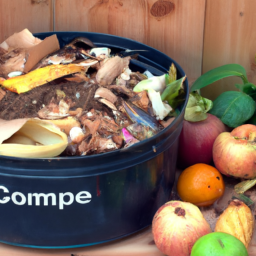
Composting Techniques and Tips: How to Turn Waste into Nutrient-Rich Soil for Your Garden
Composting is a fantastic way to turn your kitchen scraps and yard waste into nutrient-rich soil that can benefit your garden. Not only does it reduce the amount of waste that goes to landfills, but it also provides a sustainable and cost-effective solution for improving soil quality. In this guide, we will explore some composting techniques and tips that will help you transform waste into garden gold.
1. Getting Started with Composting
The first step in composting is to choose the right location for your compost pile or bin. Ideally, it should be placed in a well-drained area that receives partial sunlight. Next, gather your composting materials. These can be divided into two categories: greens and browns.
Greens include nitrogen-rich materials such as fruit and vegetable scraps, coffee grounds, and fresh grass clippings. Browns, on the other hand, are carbon-rich materials like dried leaves, straw, and shredded newspaper. It’s important to maintain a balance between greens and browns to ensure proper decomposition.
Once you have your materials, start by creating a layer of browns at the bottom of your compost pile or bin. This will help with aeration and prevent the pile from becoming too compact. Add a layer of greens on top of the browns, followed by another layer of browns. Repeat this layering process until you have used up all your composting materials.
2. Maintaining Your Compost Pile
Composting is an ongoing process that requires regular maintenance. To ensure proper decomposition, it’s essential to provide your compost pile with the right conditions. Here are some tips to help you maintain your compost pile:
A. Moisture: Your compost pile should be moist, but not soaking wet. If it feels dry, add some water to keep the decomposition process going. On the other hand, if it’s too wet, add more browns to absorb the excess moisture.
B. Aeration: Oxygen is crucial for the decomposition process. Turn your compost pile regularly using a pitchfork or shovel to introduce air into the pile. This will help speed up decomposition and prevent unpleasant odors.
C. Temperature: Composting generates heat, which is a sign that the process is working. Ideally, the temperature should be between 120-160°F (49-71°C). If your compost pile is not heating up, it may need more greens or browns to balance the carbon-to-nitrogen ratio.
3. Troubleshooting Common Composting Issues
While composting is a relatively simple process, you may encounter some common issues along the way. Here are a few troubleshooting tips to help you overcome them:
A. Slow Decomposition: If your compost pile is taking longer than expected to decompose, it may be due to a lack of nitrogen. Add more greens to increase the nitrogen content and speed up the process.
B. Unpleasant Odors: Foul smells can indicate that your compost pile is too wet or lacks sufficient aeration. Make sure to turn the pile regularly and add more browns to absorb excess moisture.
C. Pests and Rodents: To prevent unwanted visitors in your compost pile, avoid adding meat, dairy products, or oily foods. These can attract pests and rodents. Additionally, consider covering your compost pile with a layer of straw or a compost bin with a secure lid.
By following these composting techniques and tips, you can transform your waste into nutrient-rich soil for your garden. Remember to be patient, as the composting process can take several months to a year, depending on various factors such as temperature and the types of materials used. Happy composting!
Here’s the Summary Snapshot
Composting is a simple and effective way to turn kitchen scraps and yard waste into nutrient-rich soil for your garden. Not only does it reduce waste going to landfills, but it also helps you create your own garden gold. In this blog post, we will cover the basics of composting, so you can get started on this eco-friendly journey.
To start composting, you’ll need a compost bin or pile in a suitable location. This can be in your backyard or even a small space on your balcony. The key is to have a good balance of organic materials, such as fruit and vegetable scraps, coffee grounds, and yard trimmings. Avoid adding meat, dairy, or oily foods as they can attract pests and slow down the decomposition process. As you add these materials to your compost pile, make sure to mix them regularly to provide oxygen and promote decomposition. Additionally, you can speed up the process by adding some water to keep the pile moist, but not wet.
Over time, the organic matter will break down and transform into nutrient-rich compost, often referred to as “black gold” for gardeners. This compost can be used to enrich your soil, improve its structure, and provide essential nutrients to your plants. Spread it around your garden beds, mix it with potting soil for potted plants, or use it as a top dressing for your lawn. Composting is not only a sustainable way to reduce waste but also a fantastic way to create a healthier and more productive garden. So, why not give it a try and turn your waste into garden gold?
Here are the top questions that we were asked:
Q1: What is composting?
A1: Composting is the process of breaking down organic materials, such as food scraps, yard waste, and other biodegradable items, into a nutrient-rich soil amendment called compost. It is a natural way to recycle organic waste and create a valuable resource for your garden.
Q2: Why should I compost?
A2: Composting offers numerous benefits. Firstly, it reduces the amount of waste that goes to landfills, helping to minimize environmental impact. Secondly, compost enriches the soil with essential nutrients, improves its structure, and enhances water retention, leading to healthier plants. Lastly, it promotes biodiversity and reduces the need for chemical fertilizers, making it an eco-friendly gardening practice.
Q3: How do I start composting?
A3: Starting composting is easy! Begin by selecting a suitable location in your yard or garden for a compost pile or bin. Collect organic waste such as fruit and vegetable scraps, coffee grounds, eggshells, yard trimmings, and leaves. Layer these materials, making sure to include a mix of “green” nitrogen-rich materials (like kitchen scraps) and “brown” carbon-rich materials (such as dry leaves). Moisten the pile occasionally and turn it regularly to aerate the compost. Over time, the organic matter will decompose and transform into nutrient-rich compost.
Q4: What should I not compost?
A4: While many organic materials can be composted, there are a few items that should be avoided. Do not compost meat, fish, dairy products, oils, fats, or pet waste as they can attract pests or introduce harmful pathogens. Additionally, avoid composting weeds with mature seeds, diseased plants, or plants treated with herbicides. These can impact the quality of the compost or introduce unwanted pests and diseases to your garden.
Q5: How long does it take to make compost?
A5: The time it takes to make compost can vary depending on various factors such as the materials used, the size of the compost pile, and the environmental conditions. Typically, it takes anywhere from a few months to a year for compost to fully mature. Regularly turning the pile, maintaining the right moisture level, and ensuring a good balance of green and brown materials can speed up the composting process.
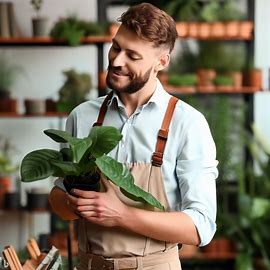
Alex Turner is a sustainable gardening advocate and the founder of an acclaimed indoor gardening blog. With a focus on eco-friendly practices and urban sustainability, Alex combines his background in environmental studies with his love for plants to educate readers on mindful indoor gardening. His work highlights the importance of nurturing both plants and the planet.

